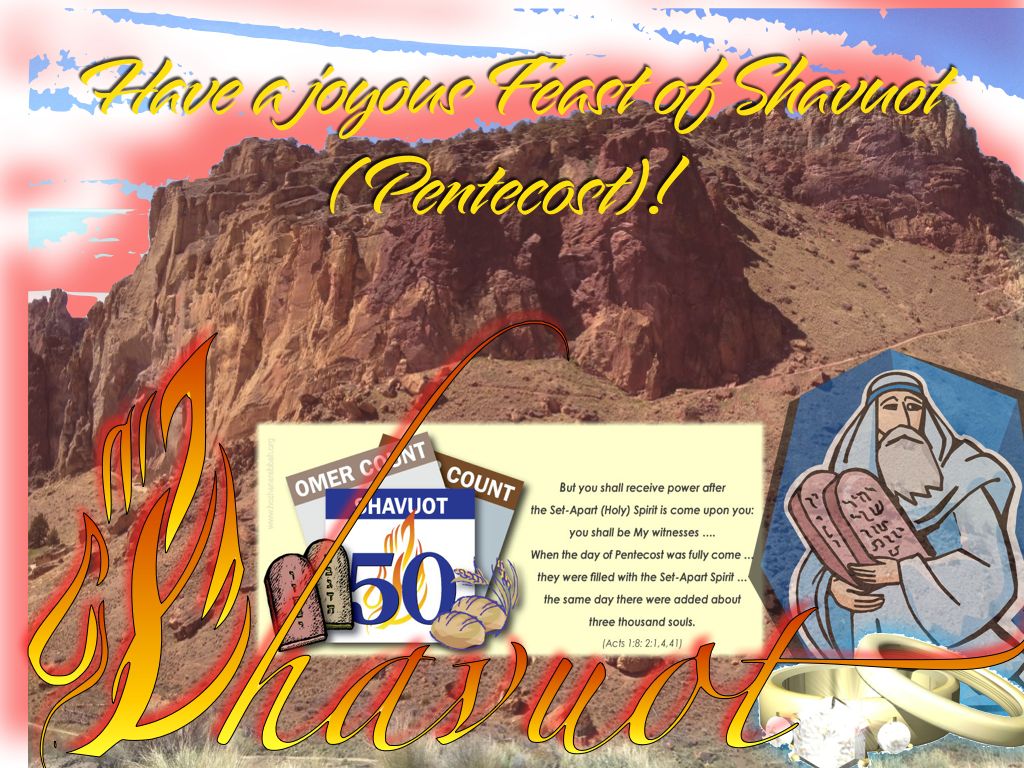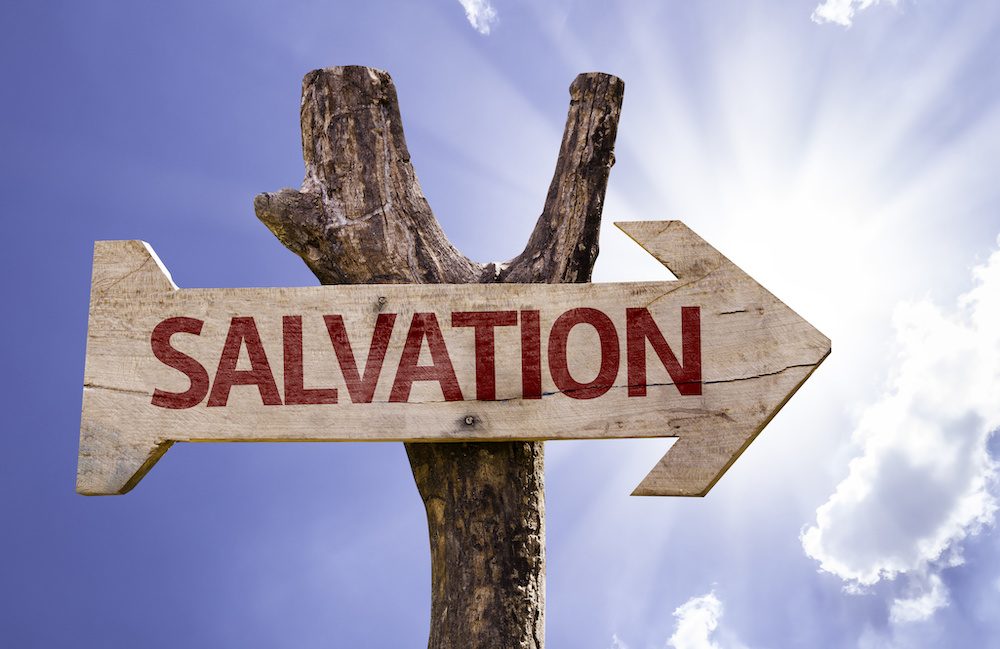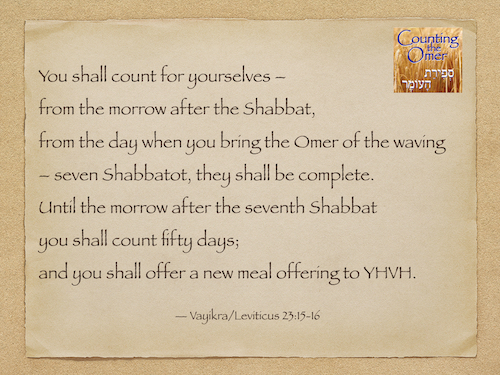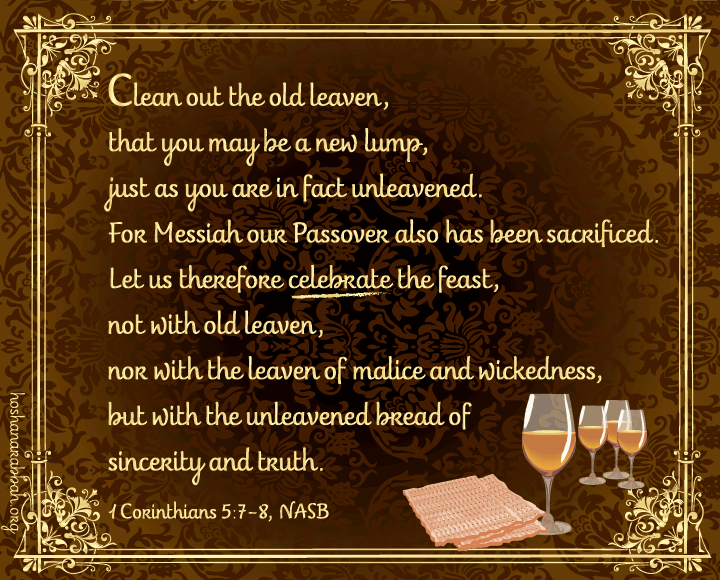
What is Shavuot All About?
In the roughly 49 days between Passover (Pesach) and the Feast of Pentecost (Chag haShavuot), a momentous spiritual dynamic occurs. This period of time is comprised of forty-nine days or seven days of seven weeks, which is seven times seven—the biblical number for complete or full perfection. Add one day and you arrive at Pentecost. Fifty is the biblical picture of jubilee picturing redemption from the enslavement to this world.
Historically, the children of Israel were redeemed from their sins by the blood of the lamb on the first Passover in Egypt. At this time, YHVH betrothed himself to Israel (Exod 6:7). YHVH then led them out of Egypt into the wilderness, and on Shavuot he married them at Sinai (Exod 24 cp. Ezek 16:8; Jer 2:2; 31:32). At the same time, YHVH gave them his Torah, which was their ketubah or marriage vows.
Shavuot is a picture of the bride of Yeshua the Messiah coming into full maturity spiritually and coming to marriageable age. She has gone from being a spiritual child and slave in Egypt to becoming the fully mature spiritual bride and queen of the King of the universe.
At the time of Yeshua, he betrothed himself to both houses of Israel on Passover. Then, on Pentecost, he then sent his Spirit, the Comforter, as a seal of this covenant. He hasn’t married this bride (that’s you and me) yet — something that occurs at his second coming. In the mean time, he has placed her in a 2000-years-long wilderness to get ready for him — to fall in love with him (to love him by keeping his Torah commands; John 14:15) by receiving his Torah into their hearts.
In the end times, he’s going to bring his bride (the saints) out of the wilderness of Babylon (called the Second Exodus), and they will repent of their Torahless ways. We are now getting ready for this day.
Understanding the prophecies of the Bible that speak of these end-time events, and understanding who the principal players are (the two houses of Israel) is the key to insure that we’re ready for our Messiah — that we’ll be wise and not foolish virgins who have our lamps full of oil (the Torah and Spirit of Elohim).
Shavuot, along with Passover (Pesach) and the Feast of Tabernacles (Sukkot) are three times each year when YHVH commands his people to gather together to celebrate before him (Exod 23:14–17).
To fully comprehend Shavuot, we must step back and view this feast in its context with the other six biblical feasts that YHVH gave to Israel.
YHVH’s Seven Biblical Feasts
The seven annual biblical festivals of YHVH Elohim (or, in our English Bibles, the LORD God), of which Shavuot (Pentecost) is the third of seven, are prophetic shadow-pictures or symbols of the steps that sinful man must take to be reconciled to YHVH Elohim, his Heavenly Father. They are YHVH’s plan for man’s salvation or redemption rolled up into seven easy-to-understand steps. Though even a child can understand these seven feasts, the truths contained in these divine time-space vessels can be expanded and unfolded until the entire message of the Bible from Genesis to Revelation lies open before us like a road map. It is a road that leads us to a trove of spiritual treasures whose vastness and depth is staggering, rich and unfathomable. These feast days are literally the skeletal structure upon which the truths of the entire Bible hang. The message of redemption, sanctification, salvation, the atonement, glorification, end-time events (eschatology), the history of Israel, the entire gospel message, the covenants of the Bible, the marriage of the Lamb, the bride of Messiah and Yeshua the Messiah are all prefigured within the glorious template of YHVH’s set-apart feast days contained in seven steps—seven being the biblical number of divine perfection and completion.
Before delving into the subject of Shavuot, we first need to understand why we should not only study, but also celebrate YHVH’s biblical feasts, and how they relate to the seven steps of redemption. To fully appreciate Shavuot, this background understanding is essential.
Seven Reasons to Study and Celebrate YHVH’s Appointed Times
- YHVH’s feasts are a prophetic shadow-picture of things to come (Col 2:16–17; Heb 10:1). When they were given to ancient Israel, they pointed forward to future events that would occur to that nation. The spring feast days, for example, pointed to Messiah’s first coming, while the fall feast days point to his second coming leading into the Messianic Age (or Millennium) and into eternity beyond.
- All the feast days point to Yeshua. The name Yeshua means “salvation” and these days all point to the various steps along the path of salvation that redeemed believers find themselves on.
- Many of the feast days point back to historical events that occurred in Israel’s history from which we can learn lessons and which are representative of our own spiritual journey (1 Cor 10:1–6,11).
- In the Scriptures, YHVH commands his people to keep the biblical feasts. They are called moedim, which is a Hebrew word meaning “divine appointment.” They are times when YHVH makes a spiritual appointment to meet with his people (Lev 23:1–2,4). That time, YHVH teaches his people about his wonderful plan of salvation or redemption of the world through Yeshua the Messiah.
- The feasts are in the Bible, which is the inspired Word of Elohim (2 Tim 3:16). He commands his people everywhere to obey his Word and to observe his feasts (Matt 4:4; Lev 23; Matt 5:17–20) forever (Lev 23:14,21,41; Mal 3:6; Heb 13:8)!
- The feast days set forth the pattern of heavenly things on earth (Heb 8:1–2, 5; 9:8–9, 23; Exod 25:8–9, 40; 26:30; Num 8:4; Ezek 43:1–6, 10–12).
- We as physical beings need physical means and methods to help us understand spiritual realities. YHVH gives us things to do in this physical dimension to help us to understand the supernatural (or spiritual) level (1 Cor 2:9–13).
The Seven Feasts Represent YHVH’s Seven-Steps Plan of Salvation for Mankind

To understand Shavuot we must understand how it fits into the context of the other six biblical feasts that come before and after it. Together all seven festivals of YHVH form a glorious mosaic with each building upon the one before as YHVH’s plan of salvation progressively expands and unfolds.
The first feast of YHVH’s annual festival cycle is Pesach (Passover), which is the first step in a parade of seven prophetic dress rehearsals or set-apart convocationsor appointed times when the Creator of the universe met with his chosen and called out people. These special occasions all point to the redemptive work of Messiah Yeshua in the life of the redeemed believer. There are three festivals in the spring of the year that are prophetic shadow-pictures of Messiah’s first coming to earth, and there are four fall feasts, which are prophetic shadow-pictures of his second coming at the end of this age.
Passover (Pesach)
The first festival in YHVH’s glorious seven-step plan of redemption is Pesach or Passover, which occurs in the early spring of the year at the time of the rebirth of the creation after a long and dead winter season. Likewise, it was the time of the birth of the nation of Israel. The children of Israel had been enslaved in Egypt for many years, but they could not extricate themselves from the death grip of Pharaoh, a picture of Satan, without divine intervention. YHVH heard their cries of anguish, and he instructed them to sacrifice a lamb and smear its blood on the doors of their homes. This they did by faith and YHVH extended his grace and mercy upon them when he spared them from his judgment and passed over their homes. Though sinful and worthy of death, YHVH delivered the Israelites from the wages of their sins, which is death, and at the same time the Egyptians, who were also sinners, received judgment unto death because they were not under the blood of the lamb. The blood of the lamb made it possible for Israel to leave Egypt.
Spiritually one must leave the world (spiritual Egypt), a place of spiritual oppression and slavery, darkness and false religion. This is the realm or kingdom of Satan, the prince of death. One cannot leave the kingdom of darkness on one’s own strength, however. One cannot free oneself from slavery to the strong tyrants and masters of this world, the flesh or the devil. A greater power than these must deliver us from the spiritual slave masters who keep humans in their death grip. Only by the blood of the Lamb of YHVH smeared on the door posts and lintels (representing our actions and thoughts) of our houses (representing our lives) will YHVH’s judgment against sin pass over us. This is because Yeshua the Lamb of YHVH defeated the enemy at the cross and defeated the death sentence or death grip of sin by resurrecting from the grave on the third day after his death (Col 2:12–15). The Israelites, by faith, trusted in the blood of the lamb (a prophetic picture of Yeshua the Lamb to come), and by YHVH’s grace their sins were not credited to their account, but were forgiven them. They were then free to began to leave Egypt.
Feast of Unleavened Bread (Chag HaMatzot)
The Israelites left Egypt on the first day of this seven-day long festival. Leaving Egypt was a relatively simple process, but now began the process of “getting Egypt out of them.” Dying to one’s sin nature and overcoming all the sinful habits in our lives is a process. We cannot do this by our own efforts, but we need the help of the Redeemer to deliver us. This is illustrated during Chag HaMatzot when YHVH commands his people to remove all the physical leavening from their homes. Leavening is a biblical picture of sin, pride and bitterness, since yeast is sour and causes bread to rise and puff up. Pride and hypocrisy deceives one into believing that one is righteous when he is not. This is the state of spiritual delusion in which all humans naturally find themselves.
YHVH has given men six days (or 6000 years) to come to realize his sinfulness. The seventh day of this week-long festival is a high Sabbath day that pictures YHVH’s Messianic Age (Millennium) when humans will be living in harmony with YHVH and resting in the saving work of the blood of Yeshua the Lamb slain from the foundation of the world. It represents victory over sin (leavening).
This concept is illustrated when Israel celebrated the Passover in the Promised Land, and then marched around Jericho for six days. On the seventh day, the walls of Jericho came down! Because of the context of this Scripture passage, it is probable that Israel did this during the seven days of Unleavened Bread and on the seventh day of that festival the walls of Jericho came down (see Josh 6:10–7:1–16). If so, this very well could be a prophetic picture of a similar scenario of what will occur in the near future when the exiled redeemed Israelites return to the land of Israel at the second coming of Yeshua the Messiah. YHVH will have to supernaturally destroy those Canaanite inhabitants of the Promised Land who will be blocking the entry of YHVH’s saints into the land of their promised inheritance.
The Feast of Weeks or Pentecost (Shavuot)
Continue reading





